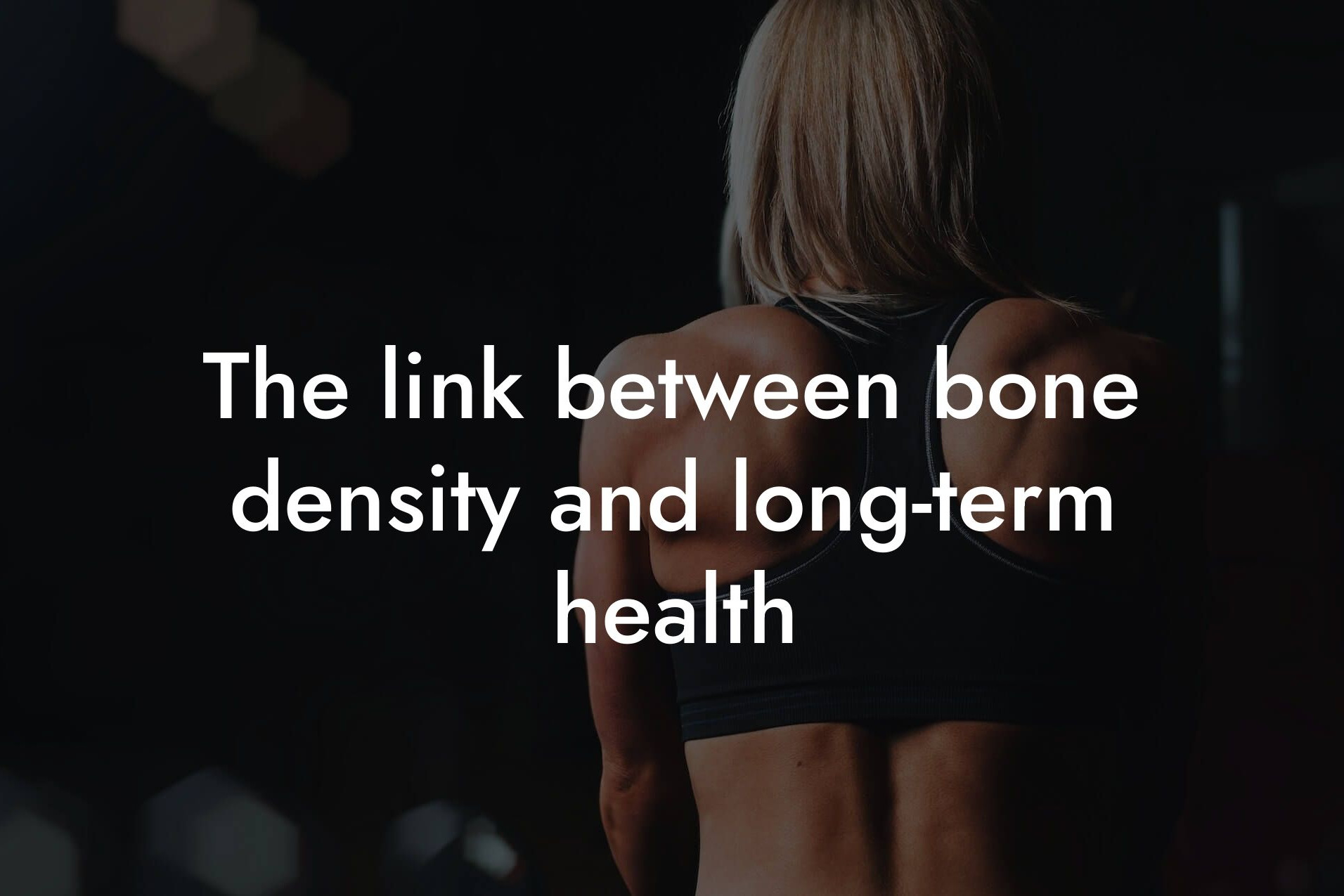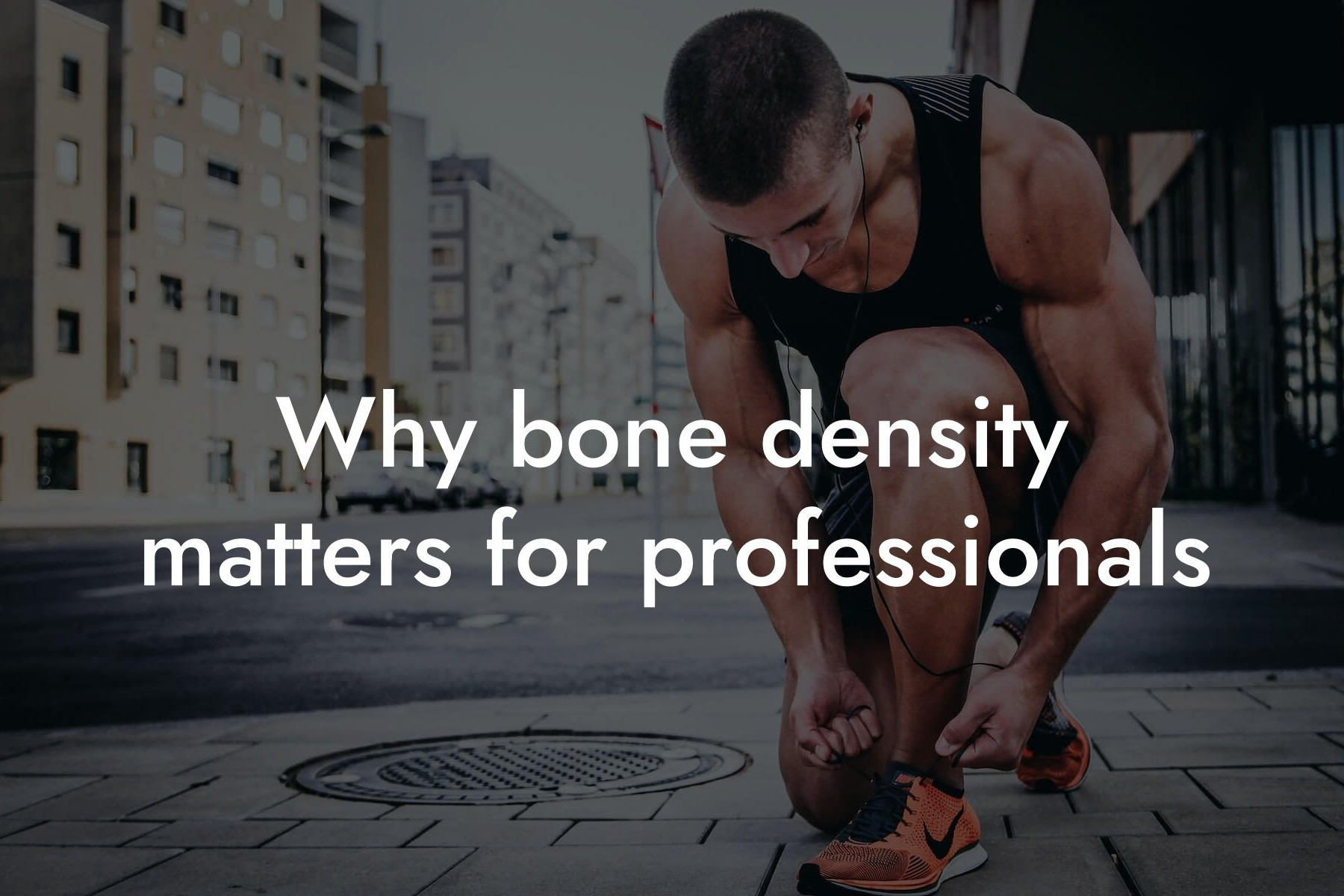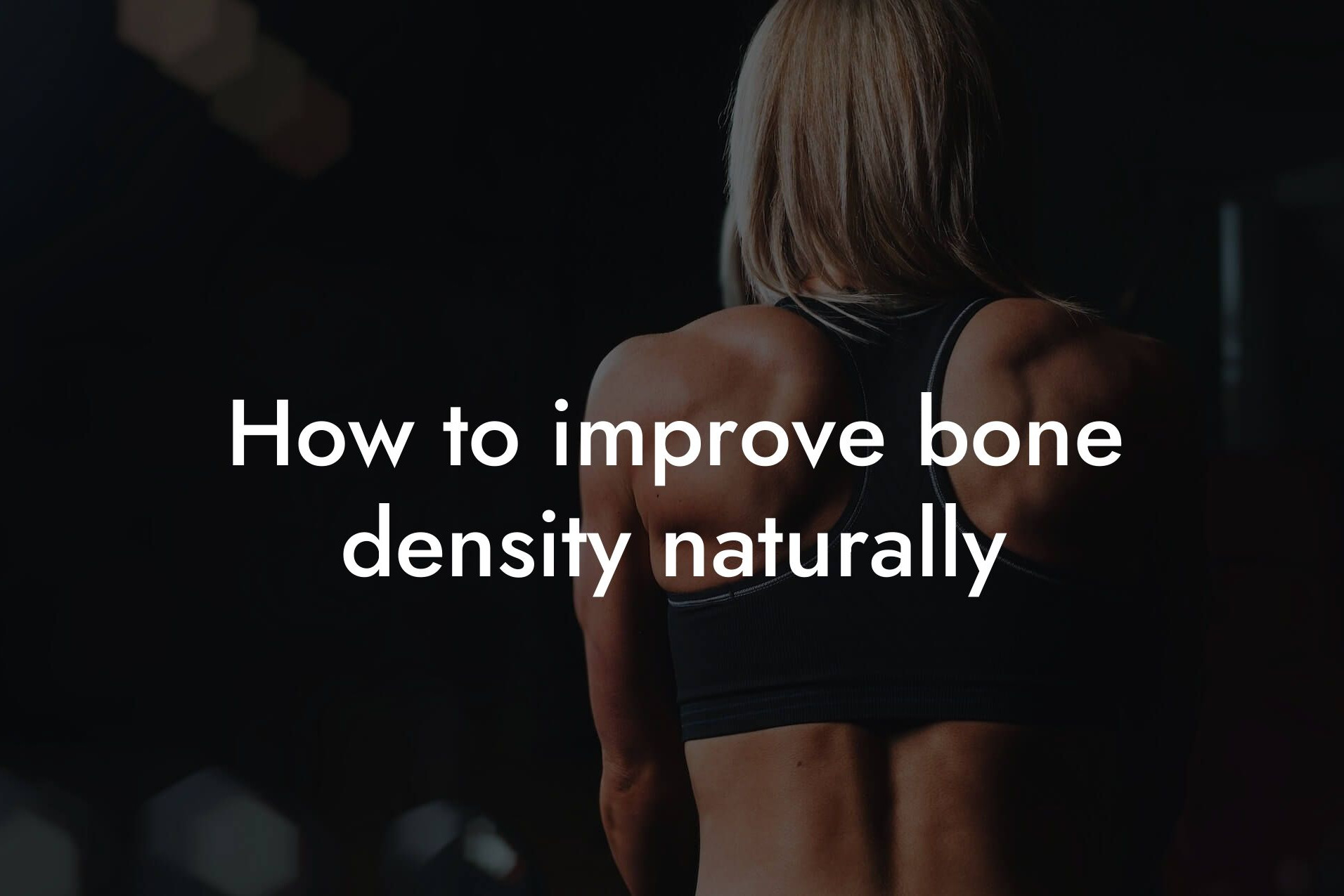As high-earning professionals, you understand the importance of maintaining a healthy and fit physique to perform at your best. While body fat and physique are often top of mind, bone density is a critical aspect of overall health that should not be overlooked, especially as we age. In this article, we'll delve into the importance of bone density, how it changes with age, and what professionals need to consider to maintain strong, healthy bones.
Table of Contents
The Importance of Bone Density
Bone density refers to the amount of minerals, such as calcium and phosphorus, present in your bones. Having strong, dense bones is essential for supporting your body's structure, facilitating movement, and protecting vital organs. Good bone density also reduces the risk of osteoporosis, a condition characterized by brittle and porous bones, which can lead to fractures and other serious health issues.
How Bone Density Changes with Age
Bone density naturally decreases with age, a process that can begin as early as the mid-30s. This decline can be attributed to several factors, including:
• Hormonal changes: Decreases in estrogen and testosterone levels can contribute to bone loss.
• Reduced physical activity: Less exercise and mobility can lead to weaker bones.
• Poor nutrition: Inadequate calcium and vitamin D intake can impede bone growth and density.
• Genetics: Family history and genetic predisposition can play a role in bone density decline.
Risks Associated with Low Bone Density
Low bone density can have serious consequences, including:
• Osteoporosis: Weakened bones increase the risk of fractures, particularly in the hips, spine, and wrists.
• Fractures: Weak bones are more susceptible to breaks, which can lead to chronic pain, disability, and even death.
• Decreased mobility: Low bone density can limit physical activity, reducing overall quality of life.
• Increased healthcare costs: Osteoporosis-related fractures can result in significant medical expenses and lost productivity.
Factors That Affect Bone Density
In addition to age, several factors can influence bone density, including:
• Gender: Women are more likely to experience bone density loss due to hormonal changes during menopause.
• Lifestyle: Sedentary behavior, excessive alcohol consumption, and smoking can all negatively impact bone density.
• Nutrition: Inadequate calcium and vitamin D intake, as well as a diet high in processed foods and sugar, can contribute to bone loss.
• Medical conditions: Certain diseases, such as rheumatoid arthritis, can increase the risk of bone density decline.
Assessing Bone Density
Fortunately, bone density can be easily assessed using a DEXA (Dual-Energy X-ray Absorptiometry) scan. This non-invasive test measures bone density in the hips and spine, providing a comprehensive picture of your bone health. At Tano Performance Group, we offer DEXA scans as part of our complete body assessment, providing professionals like you with a detailed understanding of their bone density and overall health.
Strategies for Maintaining Healthy Bone Density
While bone density decline is a natural part of aging, there are several strategies to help maintain healthy bones:
• Engage in regular exercise: Weight-bearing activities, such as running, jumping, and strength training, can help stimulate bone growth.
• Eat a balanced diet: Focus on consuming calcium-rich foods, such as dairy products, leafy greens, and fortified plant-based milk, as well as vitamin D-rich foods, like fatty fish, egg yolks, and mushrooms.
• Get enough sleep: Aim for 7-8 hours of sleep per night to help regulate hormones and support bone health.
• Manage stress: Chronic stress can lead to hormonal imbalances, which can negatively impact bone density.
Maintaining healthy bone density is crucial for professionals like you who want to perform at their best and reduce the risk of osteoporosis and related health issues. By understanding the importance of bone density, how it changes with age, and the factors that affect it, you can take proactive steps to support your bone health. At Tano Performance Group, we're committed to providing you with the tools and knowledge you need to achieve optimal health and wellness. Schedule your DEXA scan today and take the first step towards a stronger, healthier you.
Frequently Asked Questions
What is bone density, and why is it important?
Bone density refers to the measure of how dense and strong your bones are. It's an important indicator of your overall bone health, as it can predict your risk of osteoporosis and fractures. As we age, our bone density naturally decreases, which can lead to brittle and fragile bones. Maintaining healthy bone density is crucial, especially for high-earning professionals like yourself who lead active lifestyles and want to preserve their physical appearance and physique.
How does aging affect bone density?
Aging is one of the primary factors that contribute to decreased bone density. As we get older, our bodies produce less bone tissue, and the existing bone tissue breaks down more quickly. This natural process can lead to a decline in bone density, making our bones more susceptible to fractures and osteoporosis. However, it's not just about age – other factors like genetics, diet, exercise, and hormone levels also play a significant role.
What are the symptoms of low bone density?
The symptoms of low bone density can be subtle, but they can have a significant impact on your daily life. Some common symptoms include back pain, stooped posture, loss of height, and fractures. If you're experiencing any of these symptoms, it's essential to consult with a healthcare professional to rule out underlying conditions like osteoporosis.
How is bone density measured?
Bone density is typically measured using a dual-energy X-ray absorptiometry (DXA) scan. This non-invasive test uses X-rays to measure the density of your bones, usually in the hip and spine. The results are then compared to a standard score to determine your bone density. Other methods, such as ultrasound and CT scans, can also be used, but DXA is the most common and accurate method.
What is osteoporosis, and how is it related to bone density?
Osteoporosis is a condition characterized by brittle and porous bones, making them more prone to fractures. It's often referred to as a "silent disease" because it can progress without noticeable symptoms until a fracture occurs. Low bone density is a significant risk factor for osteoporosis, and it's estimated that over 200 million people worldwide suffer from the condition.
Can exercise improve bone density?
Absolutely! Exercise, especially weight-bearing and resistance training, can help improve bone density. This is because exercise stimulates the growth of new bone tissue and strengthens existing bones. Activities like running, jumping, and weightlifting are excellent for building strong bones, but it's essential to start slowly and progress gradually to avoid injury.
What role does diet play in maintaining healthy bone density?
Diet plays a crucial role in maintaining healthy bone density. A diet rich in calcium, vitamin D, and other essential nutrients can help promote bone health. Foods like dairy products, leafy greens, and fortified cereals are excellent sources of calcium, while fatty fish, egg yolks, and mushrooms are rich in vitamin D. Additionally, a balanced diet that includes adequate protein, magnesium, and other nutrients is essential for overall bone health.
How does hormone imbalance affect bone density?
Hormone imbalance, particularly low levels of estrogen and testosterone, can contribute to decreased bone density. Hormones play a crucial role in regulating bone metabolism, and an imbalance can disrupt this process, leading to bone loss. This is why hormone replacement therapy is often used to treat osteoporosis in postmenopausal women and men with low testosterone levels.
Can stress affect bone density?
Yes, chronic stress can have a negative impact on bone density. When we're stressed, our bodies produce more cortisol, a hormone that can interfere with bone metabolism. Elevated cortisol levels can lead to bone loss, making our bones more susceptible to fractures. Managing stress through relaxation techniques, exercise, and a balanced diet is essential for maintaining healthy bone density.
How often should I get my bone density tested?
The frequency of bone density testing depends on your age, medical history, and risk factors. Generally, women over 65 and men over 70 should have a bone density test every 2-3 years. If you have a family history of osteoporosis or other risk factors, your healthcare provider may recommend more frequent testing.
What can I do to prevent bone loss and osteoporosis?
Preventing bone loss and osteoporosis requires a multi-faceted approach. This includes maintaining a healthy diet rich in calcium and vitamin D, engaging in regular exercise, managing stress, getting enough sleep, and avoiding smoking and excessive alcohol consumption. Additionally, getting regular bone density tests and consulting with a healthcare professional can help identify any issues early on.
Are there any medications that can help improve bone density?
Yes, there are several medications available that can help improve bone density. Bisphosphonates, such as alendronate and risedronate, are commonly used to treat osteoporosis. Other medications, like teriparatide and denosumab, can also help stimulate bone growth and increase bone density. However, it's essential to consult with a healthcare professional before starting any medication regimen.
Can I improve my bone density naturally?
Absolutely! While medication can be effective, there are many natural ways to improve bone density. This includes consuming a diet rich in calcium and vitamin D, engaging in regular exercise, getting enough sleep, managing stress, and avoiding smoking and excessive alcohol consumption. Additionally, incorporating natural supplements like vitamin K, magnesium, and omega-3 fatty acids into your diet may also help promote bone health.
How does menopause affect bone density?
Menopause can have a significant impact on bone density. During menopause, estrogen levels drop dramatically, leading to an increased risk of bone loss and osteoporosis. This is why postmenopausal women are at a higher risk of fractures and osteoporosis. Hormone replacement therapy and other treatments can help mitigate this risk.
Can I improve my bone density at any age?
Yes, it's never too late to improve your bone density! While it's ideal to start taking care of your bone health early on, you can still make a positive impact at any age. By incorporating healthy lifestyle habits, such as regular exercise, a balanced diet, and stress management, you can help promote bone health and reduce your risk of osteoporosis and fractures.
How does smoking affect bone density?
Smoking has a devastating impact on bone density. Smoking reduces blood flow to the bones, leading to a decrease in bone density and an increased risk of osteoporosis and fractures. Quitting smoking can significantly improve bone health and reduce the risk of related conditions.
Can I improve my bone density through yoga and Pilates?
Yes, yoga and Pilates can help improve bone density! These low-impact exercises can help strengthen your bones, improve your posture, and reduce your risk of fractures. Additionally, yoga and Pilates can help improve your balance and flexibility, reducing your risk of falls and related injuries.
How does body fat percentage affect bone density?
Body fat percentage can have a significant impact on bone density. Excess body fat can lead to increased inflammation, which can contribute to bone loss and osteoporosis. Maintaining a healthy body fat percentage through a balanced diet and regular exercise can help promote bone health and reduce the risk of related conditions.
Can I improve my bone density through supplements?
While supplements can be helpful, it's essential to consult with a healthcare professional before adding any new supplements to your regimen. Certain supplements like calcium, vitamin D, and omega-3 fatty acids can help promote bone health, but it's crucial to ensure you're getting the right amounts and combinations to achieve optimal results.
How does sleep affect bone density?
Sleep plays a critical role in bone health. During sleep, our bodies repair and regenerate bone tissue, which is essential for maintaining healthy bone density. Aim for 7-9 hours of sleep per night to help promote bone health and reduce the risk of osteoporosis and fractures.
Can I improve my bone density through stress management?
Absolutely! Chronic stress can have a negative impact on bone density, so managing stress is essential for maintaining healthy bones. Techniques like meditation, yoga, and deep breathing can help reduce stress and promote bone health.
Here are some related articles you might love...
- The link between bone density and long-term health
- Why bone density matters for professionals
- How to improve bone density naturally
- Understanding osteoporosis and its risks
- DEXA scan for bone density: What you need to know
- The role of calcium and vitamin D in bone health
- Best exercises for increasing bone density
- How stress affects bone density
- Nutrition tips for stronger bones
Zak Faulkner
Zak Faulkner is a leading authority in the realm of physical health and body composition analysis, with over 15 years of experience helping professionals optimise their fitness and well-being. As one the experts behind Tano Performance Group, Zak has dedicated his career to providing in-depth, science-backed insights that empower clients to elevate their physical performance and overall health.
With extensive knowledge of DEXA technology, Zak specializes in delivering comprehensive body assessments that offer precise data on body fat, muscle mass, bone density, and overall physique. His expertise enables individuals to make informed decisions and achieve their fitness goals with accuracy and confidence. Zak’s approach is rooted in a deep understanding of human physiology, combined with a passion for helping clients unlock their full potential through personalised strategies.
Over the years, Zak has earned a reputation for his commitment to excellence, precision, and client-focused service. His guidance is trusted by top professionals who demand the best when it comes to their health. Whether advising on fitness programs, nutritional strategies, or long-term wellness plans, Zak Faulkner’s insights are a valuable resource for anyone serious about taking their health and fitness to the next level.
At Tano Performance Group, Zak continues to lead our Content Team revolutionising how professionals approach their physical health, offering unparalleled expertise that drives real results.




